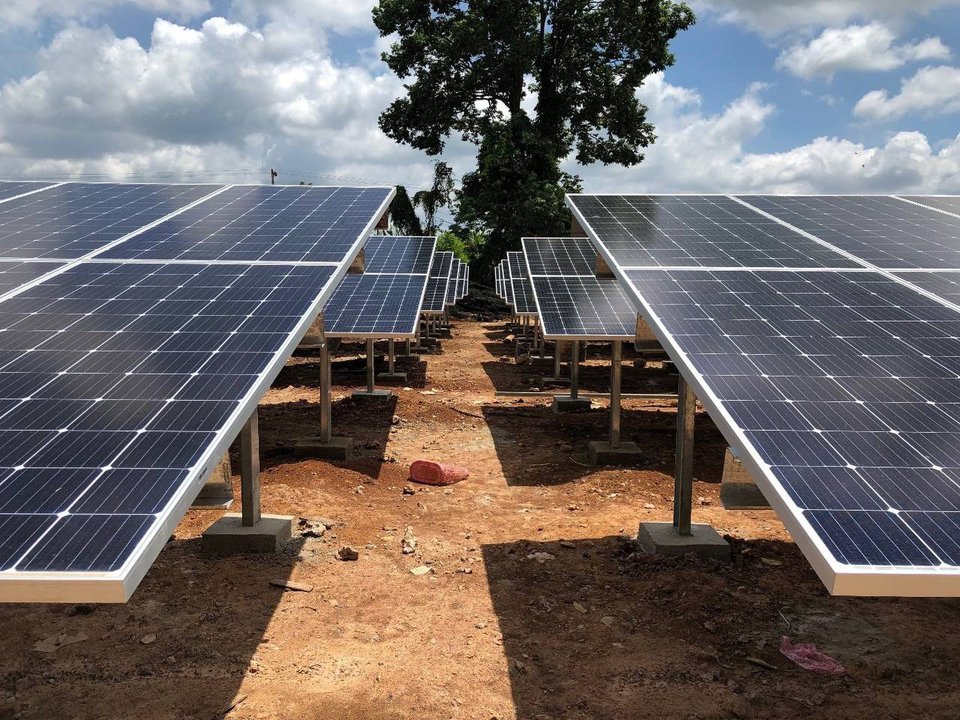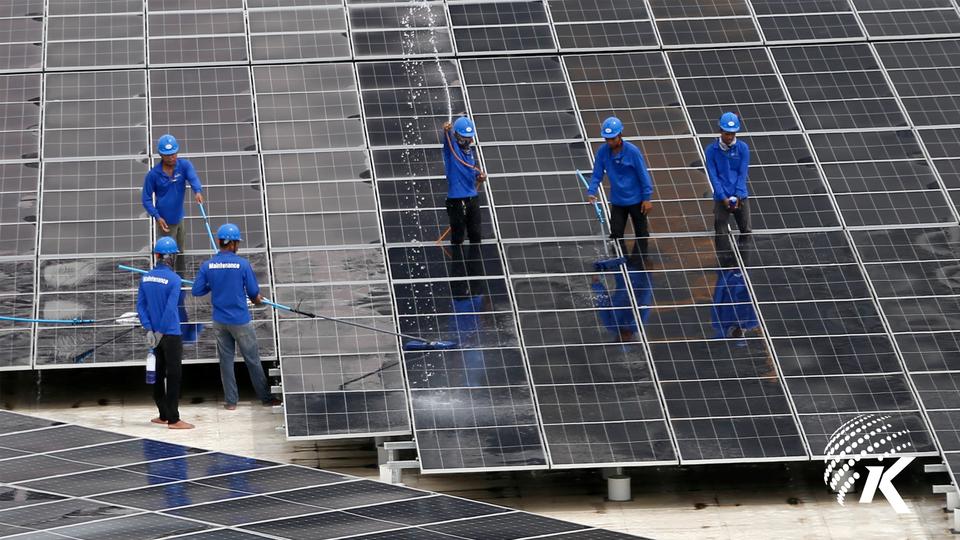
Clean energy experts are calling for concrete steps to address a labour skills shortage in the sector in Cambodia, stressing that increasing the number of qualified workers is essential to hit the 70 percent renewable energy goal by 2030
Key stakeholders are urging further development of clean energy skills and job opportunities to plug the future skills gap in the rapidly growing sector, with experts emphasising the need to build human resource capacity.
During a panel discussion, ‘Unleashing Cambodia's Clean Energy Skills Potential’ at Clean Energy Week 2025, on October 6, experts called on the government to set specific targets outlining the volume of human resources required to power Cambodia’s future workforce. This is key to building resources to align with the government’s policy.
Vongchanh Kinnaleth, lecturer-researcher and Specialist on Energy Auditor and Manager at the Institute of Technology of Cambodia (ITC), said human resources in the energy sector are essential. She added that the transition for Cambodia to meet its ambitious 70 percent renewable energy target by 2030 must put people, especially women, at the centre.
She said, “At ICT, we are committed to improving resources, making sure they have real technical skills to work in the energy sector. Importantly, we are building them to match with sustainable productivity in clean energy activities.”
Kinnaleth added that in addition to equipping students with the basic knowledge needed for the sector, providing them with hands-on experience is also important. “We believe that with the basic knowledge, experience is a key factor that needs to be built up from the beginning of their journey.”
She said that recently, many students, of which 32 percent are women, have enrolled at ITC. However, only a limited number of women join clean energy courses. She recommended strategies be put in place to encourage more females to actively participate in the sector.
“We should promote [clean energy courses],” she said, citing the example of offering women discounted fees to study certain energy-related courses.
Recruitment barrier
Vorn Chanraksmey, CEO and Founder of EGE Cambodia, said EGE receives many applications from energy sector graduates. However, she noted that many applicants lack the experience required to work there, noting the gap.
“Most of them have knowledge, yet they lack experience. Working in the energy sector requires practical records to prove that they are really capable and fit with my company's purpose,” she added.
Chanraksmey said one way to gain experience is by interning with the company, offering opportunities to learn first-hand about elements including solar panels and batteries, as well as the company’s suppliers.
Katie Proy, BKI group representative, said in Australia, women are encouraged to work in the clean energy sector. “We offer many different activities and make sure they are accessible for women, allowing women to explore their interests. If they love any activity, they can start to practice processing energy work,” she said.
Meanwhile, Lee Jerry, Director of Verywords Cambodia, said a strong knowledge is required from workers in the sector; something that is lacking in Cambodia. “We need people and resources that understand the technical skills and can work with us to achieve fruitful productivity.”
He said his company prioritises applicants who have additional soft skills, adding that staff receive training to continually improve their skills. Verywoods is also partnered with a South Korean company, so an annual training exchange takes place, further enhancing employees’ skills in the field.
“It’s helpful for Cambodian staff, making them more confident to work in the energy industry. We are trying to expand our business. If we grow, we can hire more staff, which is part of promoting the labour force in the clean energy field,” Jerry added.
According to ‘Cambodia’s Path to Sustainable Energy: Market Analysis 2024’, private companies are the “cornerstone of Cambodia's energy sector”, supplying over 80 percent of the nation's power capacity.
To improve energy delivery, the government is planning to pump $1.8 billion investment in the electricity grid by 2040. Separately, foreign firms control Cambodia's oil industry from extraction to distribution, making them key players in the sector's direction.
Drawing more resources
Song Vergenylundy, an Energy Specialist at the Cambodia Australia Partnership for Resilient Economic Development (CAPRED), is working to provide technical assistance to inject more human resources into the country’s energy sector.
He said, “We work on the purpose by building, training and designing programmes for Cambodians from the public and private sectors, which includes students and educational professionals.
“From what they have learned and know from the training, they can integrate into their curriculum to help promote clean energy awareness.”
Vergenylundy also acknowledged the need for strengthened efforts to recruit more women into the sector, adding that he does not want men to dominate the job market.
Chen Cheth, a CapCEE Project Manager at GERES, said the CapCEE project is helping “shape a new generation” of qualified energy managers and auditors, who will support the implementation of Cambodia’s National Energy Efficiency Policy and contribute to a low-carbon future.
Chet said, “All people who train with us are satisfied and have improved a lot. So, they bring their skills to share with others, like professors and local authorities within the government, through various training.”
He added that universities and students focused on the energy sector can join the training. “We also provide job and internship opportunities for those who seek help and want to build their skills,” Chet confirmed.
La Vibol, Under Secretary of State, Ministry of Labour and Vocational Training, stated that advancing Cambodia to be resilient in the energy sector requires more participation and engagement from all parties, especially the young generation who work in the field.
“We should do more collaboration together to build more human resources and create more job opportunities in the sector, as well as promote social awareness of clean energy consumption,” he said.
----
Article by: https://kiripost.com
Key stakeholders are urging further development of clean energy skills and job opportunities to plug the future skills gap in the rapidly growing sector, with experts emphasising the need to build human resource capacity.
During a panel discussion, ‘Unleashing Cambodia's Clean Energy Skills Potential’ at Clean Energy Week 2025, on October 6, experts called on the government to set specific targets outlining the volume of human resources required to power Cambodia’s future workforce. This is key to building resources to align with the government’s policy.
Vongchanh Kinnaleth, lecturer-researcher and Specialist on Energy Auditor and Manager at the Institute of Technology of Cambodia (ITC), said human resources in the energy sector are essential. She added that the transition for Cambodia to meet its ambitious 70 percent renewable energy target by 2030 must put people, especially women, at the centre.
She said, “At ICT, we are committed to improving resources, making sure they have real technical skills to work in the energy sector. Importantly, we are building them to match with sustainable productivity in clean energy activities.”
Kinnaleth added that in addition to equipping students with the basic knowledge needed for the sector, providing them with hands-on experience is also important. “We believe that with the basic knowledge, experience is a key factor that needs to be built up from the beginning of their journey.”
She said that recently, many students, of which 32 percent are women, have enrolled at ITC. However, only a limited number of women join clean energy courses. She recommended strategies be put in place to encourage more females to actively participate in the sector.
“We should promote [clean energy courses],” she said, citing the example of offering women discounted fees to study certain energy-related courses.
Recruitment barrier
Vorn Chanraksmey, CEO and Founder of EGE Cambodia, said EGE receives many applications from energy sector graduates. However, she noted that many applicants lack the experience required to work there, noting the gap.
“Most of them have knowledge, yet they lack experience. Working in the energy sector requires practical records to prove that they are really capable and fit with my company's purpose,” she added.
Chanraksmey said one way to gain experience is by interning with the company, offering opportunities to learn first-hand about elements including solar panels and batteries, as well as the company’s suppliers.
Katie Proy, BKI group representative, said in Australia, women are encouraged to work in the clean energy sector. “We offer many different activities and make sure they are accessible for women, allowing women to explore their interests. If they love any activity, they can start to practice processing energy work,” she said.
Meanwhile, Lee Jerry, Director of Verywords Cambodia, said a strong knowledge is required from workers in the sector; something that is lacking in Cambodia. “We need people and resources that understand the technical skills and can work with us to achieve fruitful productivity.”
He said his company prioritises applicants who have additional soft skills, adding that staff receive training to continually improve their skills. Verywoods is also partnered with a South Korean company, so an annual training exchange takes place, further enhancing employees’ skills in the field.
“It’s helpful for Cambodian staff, making them more confident to work in the energy industry. We are trying to expand our business. If we grow, we can hire more staff, which is part of promoting the labour force in the clean energy field,” Jerry added.
According to ‘Cambodia’s Path to Sustainable Energy: Market Analysis 2024’, private companies are the “cornerstone of Cambodia's energy sector”, supplying over 80 percent of the nation's power capacity.
To improve energy delivery, the government is planning to pump $1.8 billion investment in the electricity grid by 2040. Separately, foreign firms control Cambodia's oil industry from extraction to distribution, making them key players in the sector's direction.
Drawing more resources
Song Vergenylundy, an Energy Specialist at the Cambodia Australia Partnership for Resilient Economic Development (CAPRED), is working to provide technical assistance to inject more human resources into the country’s energy sector.
He said, “We work on the purpose by building, training and designing programmes for Cambodians from the public and private sectors, which includes students and educational professionals.
“From what they have learned and know from the training, they can integrate into their curriculum to help promote clean energy awareness.”
Vergenylundy also acknowledged the need for strengthened efforts to recruit more women into the sector, adding that he does not want men to dominate the job market.
Chen Cheth, a CapCEE Project Manager at GERES, said the CapCEE project is helping “shape a new generation” of qualified energy managers and auditors, who will support the implementation of Cambodia’s National Energy Efficiency Policy and contribute to a low-carbon future.
Chet said, “All people who train with us are satisfied and have improved a lot. So, they bring their skills to share with others, like professors and local authorities within the government, through various training.”
He added that universities and students focused on the energy sector can join the training. “We also provide job and internship opportunities for those who seek help and want to build their skills,” Chet confirmed.
La Vibol, Under Secretary of State, Ministry of Labour and Vocational Training, stated that advancing Cambodia to be resilient in the energy sector requires more participation and engagement from all parties, especially the young generation who work in the field.
“We should do more collaboration together to build more human resources and create more job opportunities in the sector, as well as promote social awareness of clean energy consumption,” he said.
----
Article by: https://kiripost.com
